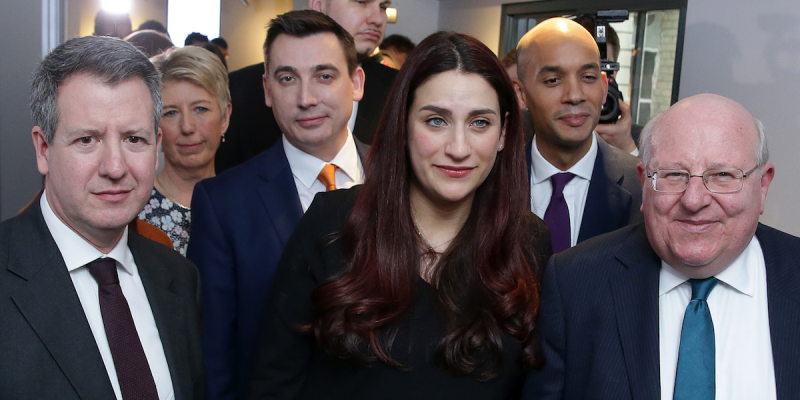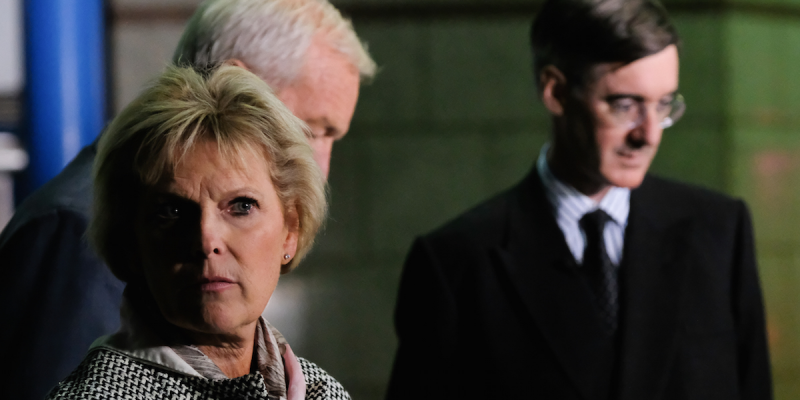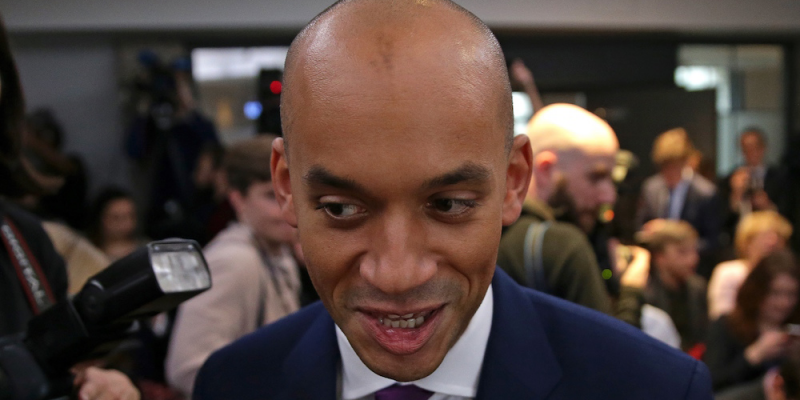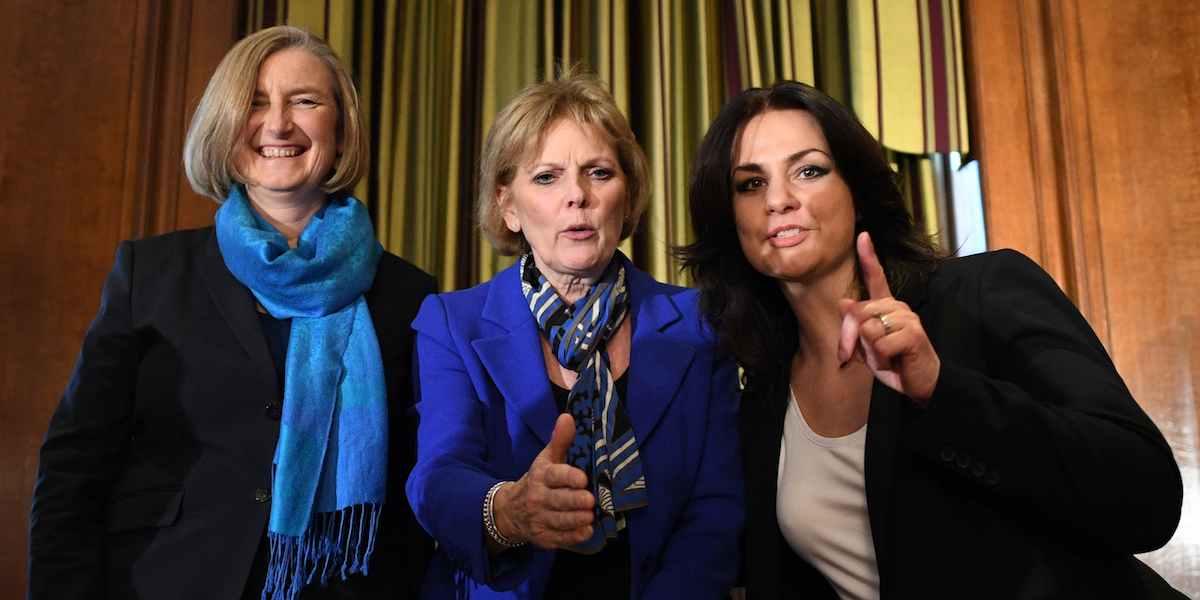- Eight Labour MPs and four Conservative MPs this week quit their parties to form a new centrist bloc called the Independent Group.
- The group’s members are all vocal opponents of Brexit, but say the group also reflects disillusionment with the leadership of the two main parties.
- More MPs are set to join the new group in the coming weeks.
- Here’s what the historic splits mean for Brexit, the future of the Conservatives and Labour, and the prospect of a snap general election.
LONDON – British politics is in a frenzy of historic proportions after eleven Members of Parliament quit the country’s two biggest parties to form a new independent grouping, with more expected to follow.
On Monday, seven MPs quit the Labour Party to launch “The Independent Group” (TIG) after losing patience with leader Jeremy Corbyn’s handling of Brexit and the antisemitism crisis which has engulfed the party.
That number became eight on Tuesday night, when Joan Ryan waved goodbye to Labour to join former shadow ministers Chuka Umunna and Chris Leslie, plus the rest of the “Magnificent Seven.”
And on Wednesday morning, Theresa May’s Conservatives suffered a split of their own, with anti-Brexit MPs Anna Soubry, Sarah Wollaston, and Heidi Allen resigning from the party to become TIG’s latest recruits.
It looks like the defections won't end there.
Labour's Deputy Leader Tom Watson warned on Monday that more MPs could leave if the party doesn't change its ways. Ian Austin MP is considering his position and others who want a new referendum on Brexit could quit next week if Corbyn doesn't support an amendment designed to achieve what campaigners call a "People's Vote."
Ex-Tory MP Allen said today that "significant numbers" of Conservative MPs were thinking about quitting the party, and said in a Westminster briefing that even some Cabinet ministers were "sympathetic" to the aims of the new group.
The UK political party system is breaking down in front of our eyes. The tectonic plates are shifting. But what will it actually mean? Is this a Brexit game-changer? Can TIG become a party of government?
Here's what we can safely say - for now.
Why did this happen?

The Brexit question which divides the nation has torn both the Conservatives and Labour in two. For months, the rival wings in each party have tried to co-exist but ultimately, the tension and profound disagreements were unsustainable.
Every MP in the TIG opposes Brexit and wanted their former party leaders to support holding a new referendum. However, May is committed to leaving all EU institutions, while Corbyn is showing no signs of backing a referendum.
But Brexit isn't the only problem.
An antisemitism crisis has engulfed the Labour Party which has infuriated the vast majority of its MPs.
Corbyn is accused of failing to properly address hundreds of allegations against party members. Luciana Berger, a Jewish MP who joined TIG on Monday, accused her former party of being "institutionally antisemitic."
The Conservative party is dealing with existential issues of its own.
At a local level, its associations have seen a surge of new members, who either used to support Nigel Farage's UKIP and/or want a hard Brexit. This had led to MPs like Allen, Wollaston, and Soubry facing possible deselection, and pressure on the party to move further to political "right."
Soubry said today that a "right-wing, anti-EU awkward squad" had taken over the party and changed it irrevocably.
The ex-Tory trio also accused May of pandering the right-wing of the Conservative party, like Jacob Rees-Mogg, and abandoning the "moderates" who support EU membership and take a more liberal stance on various issues.

Does this make an early general election more likely?
There isn't a clear answer to that.
The instability of May's government derived from her fragile minority rule has created a consensus that another snap general election will take place sooner rather than later. The fact that May's ruling Conservative party has today got a bit smaller, while opposition forces have grown, suggests that an early election has only become more likely.
But it isn't as simple as that.
In any circumstance, a majority of MPs would have to vote for a general election. If they don't, the next is scheduled for 2022. Most, if not all, TIG MPs would probably need to vote for an early election for one to take place.
But at the time of writing, TIG has no leader or policies, beyond having expressed a set of vaguely worded "core values."
It's not yet an official party and doesn't have the infrastructure to run a campaign - and probably won't for many months. If the Commons was to vote on forcing a general election in the next few months, TIG MPs almost certainly would vote against it because they would be hugely underprepared.
Soubry confirmed that the group does not want an early election, telling a press conference on Wednesday that it is "the last thing" the country needs, and instead MPs should focus on delivering a new referendum.
The TIG's Chris Leslie also confirmed he was opposed to a general election at a briefing in Westminster on Wednesday, pledging instead to focus on Brexit, accusing Labour of playing "silly games" in their calls for a snap election.
An opinion poll published today put TIG on 14%. That is a very healthy number given that the group has only existed for a few days. However, given that TIG isn't even a party yet, and it doesn't have a manifesto containing policies for people to assess, we should take these early figures with heaps of salt.
Plus, the UK's First Past The Post voting system makes it difficult for parties other than the Tories and Labour to win seats in the House of Commons. Just look at the last time MPs broke away to form a new party in the early 1980s.
The short-lived Social Democratic Party - launched in 1981 by four senior MPs who quit the Labour Party - won 11.5% of the vote in the first election it contested, but got just 6 out of a possible 650 seats for its efforts.
That's why it's not in TIG's interest to push for an election anytime soon. It needs more high-profile MPs, more resources, and more time to devise a strategy if it is to have any chance of bucking the historical trend.
And what does it mean for Brexit?

Honestly? Not that much, at least for now.
The MPs who have joined the TIG up to now all support a new referendum and all voted against May's deal when it was comprehensively defeated in the House of Commons earlier this year. They have already been factored in.
However, what happens next might be different.
Next week MPs are set to vote on an amendment tabled by Labour's Peter Kyle and Phil Wilson, which declares support for the prime minister's Brexit deal as long as she puts to a referendum.
MPs from the TIG confirmed on Wednesday that they were likely to back the amendment, but Corbyn is not expected to support it, which could be the trigger for a fresh wave of resignations. Faced with the prospect of losing more of his MPs, the Labour leader might be persuaded to back a new referendum, in order to prevent a much larger mutiny, although it is unlikely.
And on the Conservative side, the prospect of more MPs walking away might pressure May into abandoning her strategy of appeasing the pro-Brexit European Research Group and pivoting to a softer exit from the EU.
Frankly, it is difficult to plot a course for what happens next. But what cannot be questioned is that this week, UK politics has been completely turned on its head, and the dramatic change has probably only just started.
